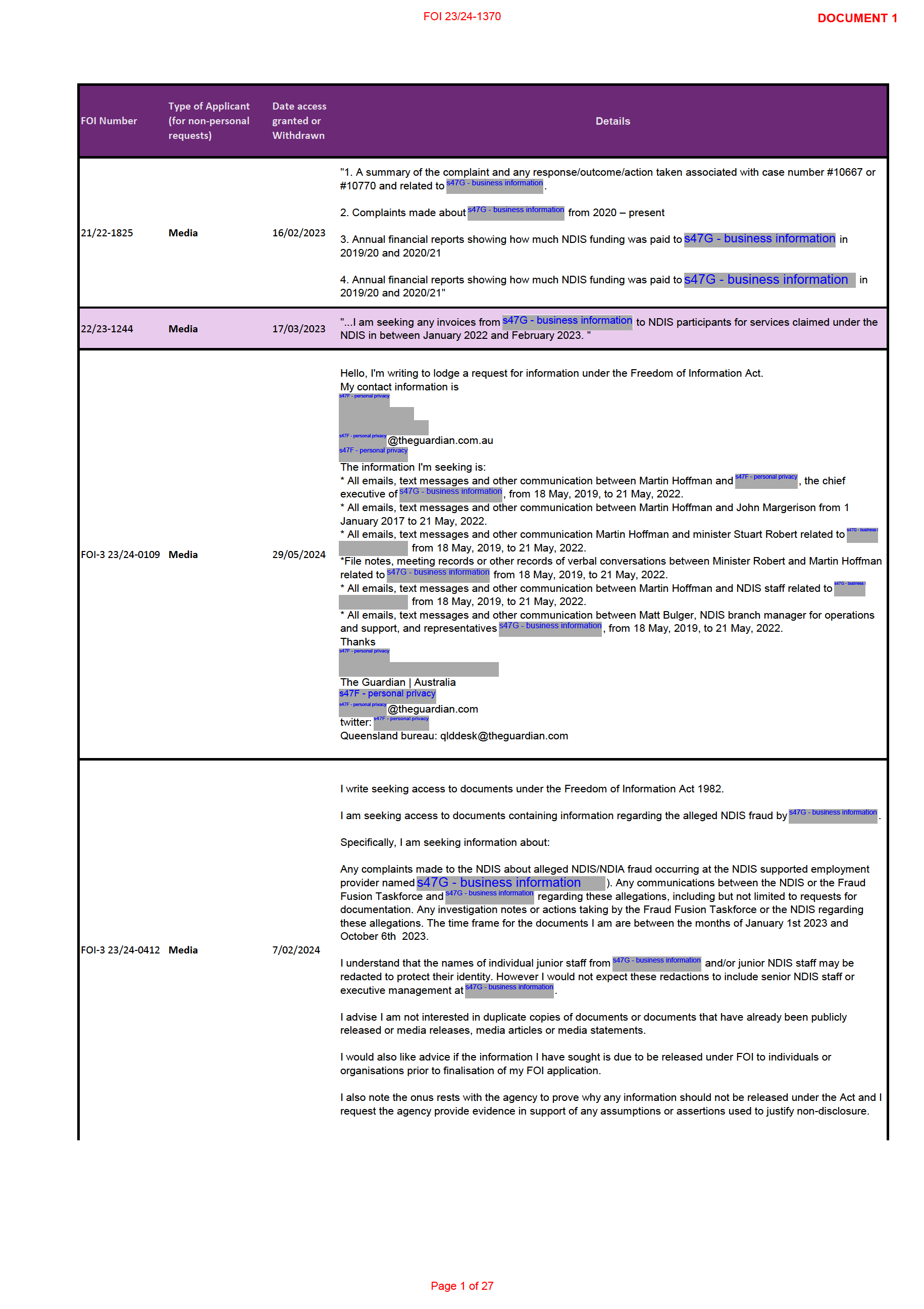
FOI 23/24-1370
Hello,
I request under the Freedom of Information Act 1982 the following details:
Al documents, including notes and other correspondence, relating to the complaints register kept by s47G - business information in
the ACT, between 2016 and 2023.
Specifically, I am seeking the complaints register itself for each year, which I understand s47G - business information is obliged to
maintain and refer to the NDIA upon request.
Could I also request:
if I could have advice if the information I have sought is due to be released under FOI to individuals or
organisations prior to finalisation of my FOI application.
a total reduction in fees and charges associated with this request as release of the information wil : contribute to
FOI-3 23/24-0534
Media
9/05/2024
community understanding on an important issue and inform debate and improve government accountability and
transparency. Further, the ABC is a non-profit, publicly funded broadcaster and warrants a remission of fees and
charges on that basis.
That the agency provide a five-day waiting period before provision of the information I have sought onto any
disclosure log as this wil assist the ABC in the preparation of any material for broadcast or publication including
assessing the information and seeking additional comment including from government.
I refer to the OAIC guidelines on this issue and request that if the agency ignores these guidelines that detailed
reasons why be provided.
Could any response please be sent by reply email to this email address.
Please feel free to call me on the below numbers if I can assist with the processing of my request, including
negotiation of scope.
Thanks in advance,
s47F - person
Page 2 of 27
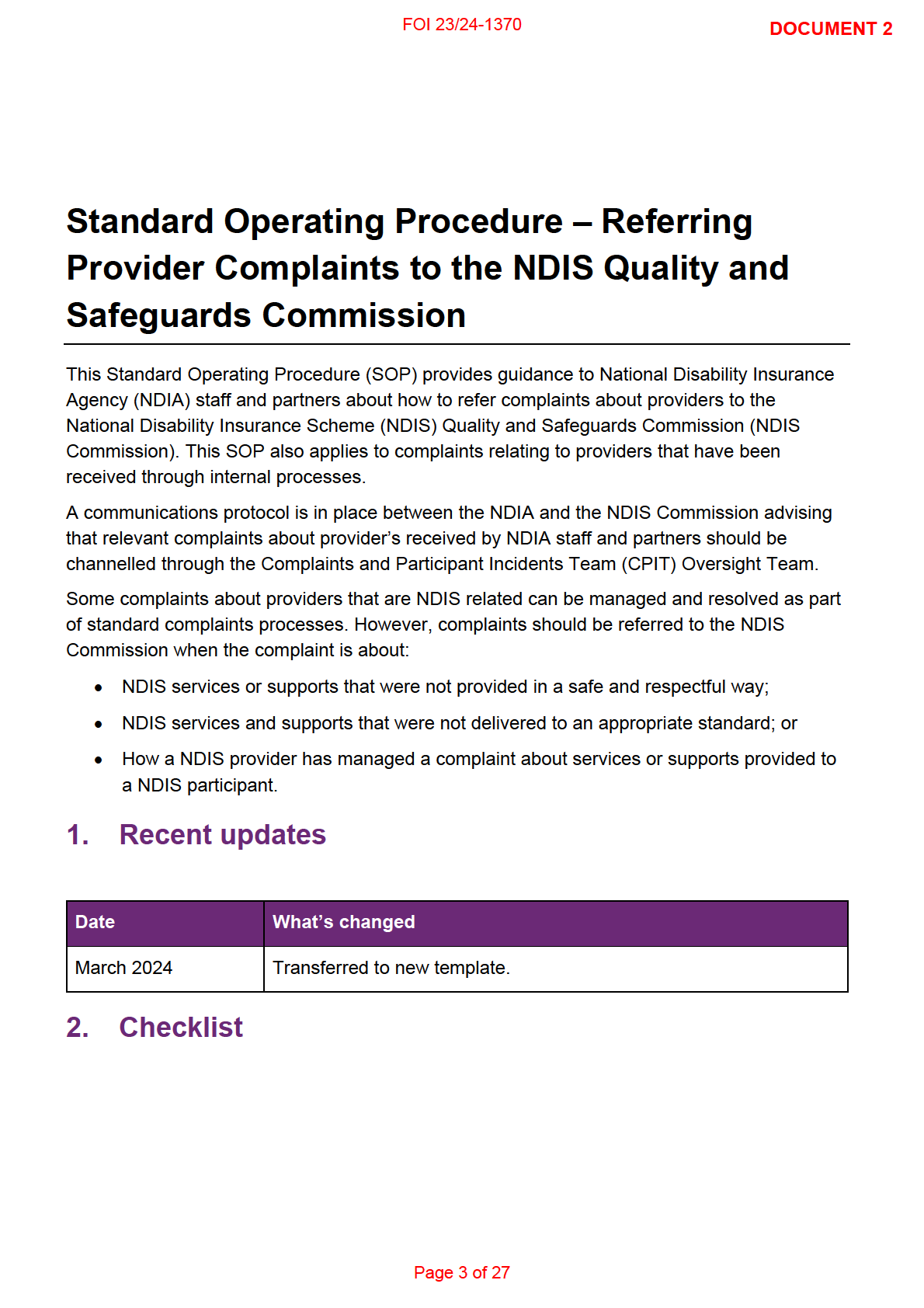
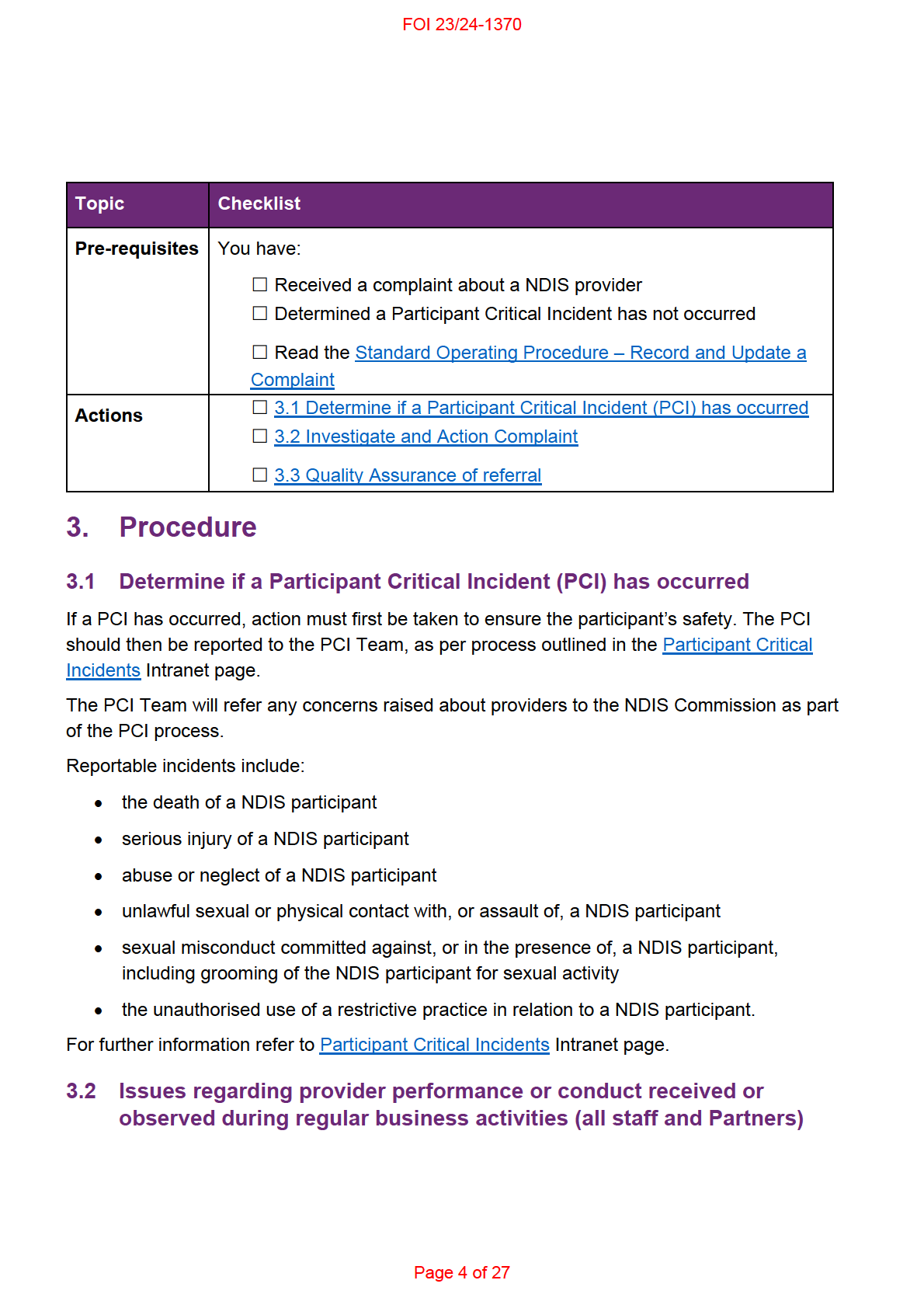
FOI 23/24-1370
If concerns about the way a provider is delivering services or conducting themselves is
received or observed during ordinary business activities (planning, check ins, enquiries etc.)
and a PCI has not been identified, the following process applies:
3.2.1 Reported concerns
• Encourage the reporter to complain to the provider directly and explain that if they are
dissatisfied with the provider’s response they can raise a complaint with the NDIS
Commission directly via 1800 035 544 (free call from landlines), TTY 133 677 or online
at https://www.ndiscommission.gov.au/contact-us/makeacomplaint
• If the reporter does not want to complain to the provider directly, the staff member can
explain that the reporter can make a complaint to the NDIS Commission via their email.
• If the reporter requires assistance and does not want to raise the issue with the NDIS
Commission or provider themselves, the staff member should offer to transfer the
complaint to the NDIS Commission at 1800 035 544.
• Staff should complete the NDIS Commission Complaint Referral Form (Appendix A)
with as much detail as possible, then email the referral to the s47E(d) - certain operations of agencies inbox
(s47E(d) - certain operations of agencies for Quality Assurance (QA) and dispatch. It is
preferable to have the reporter’s consent.
3.2.2 Staff observations
• If a staff member observes and has concerns about a providers conduct and/or service
delivery, the staff members should make a referral by completing the NDIS Commission
Complaint Referral Form (Appendix A) with as much detail as possible, then email the
referral to the s47E(d) - certain operations of agencies inbox (s47E(d) - certain operations of agencies for Quality
Assurance (QA) and dispatch.
3.3 NDIS Commission referrals received in open complaints (Complaints
Staff)
If a complaint received by the NDIA includes concerns about a provider and a PCI
has not
been identified, the following process applies:
• Create a complaint in the NDIA Business System and make contact as outlined in
Standard Operating Procedure - Al ocating and Receiving a Complaint.
• Encourage the complainant to contact the provider directly to explain that they are
dissatisfied with the provider’s response. After this they can raise a complaint with the
NDIS Commission directly via their website at:
https://www.ndiscommission.gov.au/about/making-complaint
Page 5 of 27
FOI 23/24-1370
• If the complainant does not want to complain to the provider or NDIS Commission
directly or have complained to the provider directly and are not satisfied with the
outcome, the Complaints Officer should offer to refer their complaint to the NDIS
Commission. It is preferable to have the complainant’s consent.
• The Complaints Officer should complete the NDIS Commission Complaint Referral
Form (Appendix A) with as much detail as possible, then email the referral to
s47E(d) - certain operations of agencies inbox.
• Where a complaint is best managed by the NDIS Commission the Complaints Officer
should attach the email referral to the open complaint record.
• If there are no other concerns raised in the complaint that require NDIA action the
complaint can be closed.
• Where there are other concerns requiring NDIA action, the Complaints Officer must
keep the complaint open and action as per the complaint management process relevant
to the appropriate complaint channel.
3.4 Quality Assurance of Complaint referral
On receipt of a NDIS Commission Complaint Referral, the Track Triage team within
Complaints and Participant Incidents team wil create a new complaint record in the NDIA
Business System and allocate to an Oversight Complaints Officer for QA and dispatch.
3.4.1 The assigned Complaints Officer wil consider the following requirements during
QA:
• There is sufficient information provided within the referral template to enable to the
NDIS Commission to effectively investigate the complaint.
• That the complaint falls within the NDIS Commissions remit
3.4.2 Dispatch or return
• If the request meets the QA requirements, the referral wil be sent to the NDIS
Commission s47E(d) - certain operations of agencies by the Complaints Officer via the
s47E(d) - certain operations of agencies inbox and the complaint referral wil be closed with the NDIA.
• If the Complaints Officer determines that the referral to the NDIS Commission does not
meet the QA requirements, it wil be sent back to referrer for action.
• If the Complaints Officer identifies the complaint should remain with the NDIA it wil be
reallocated to the appropriate area for resolution.
4. Related procedures or resources
Page 6 of 27
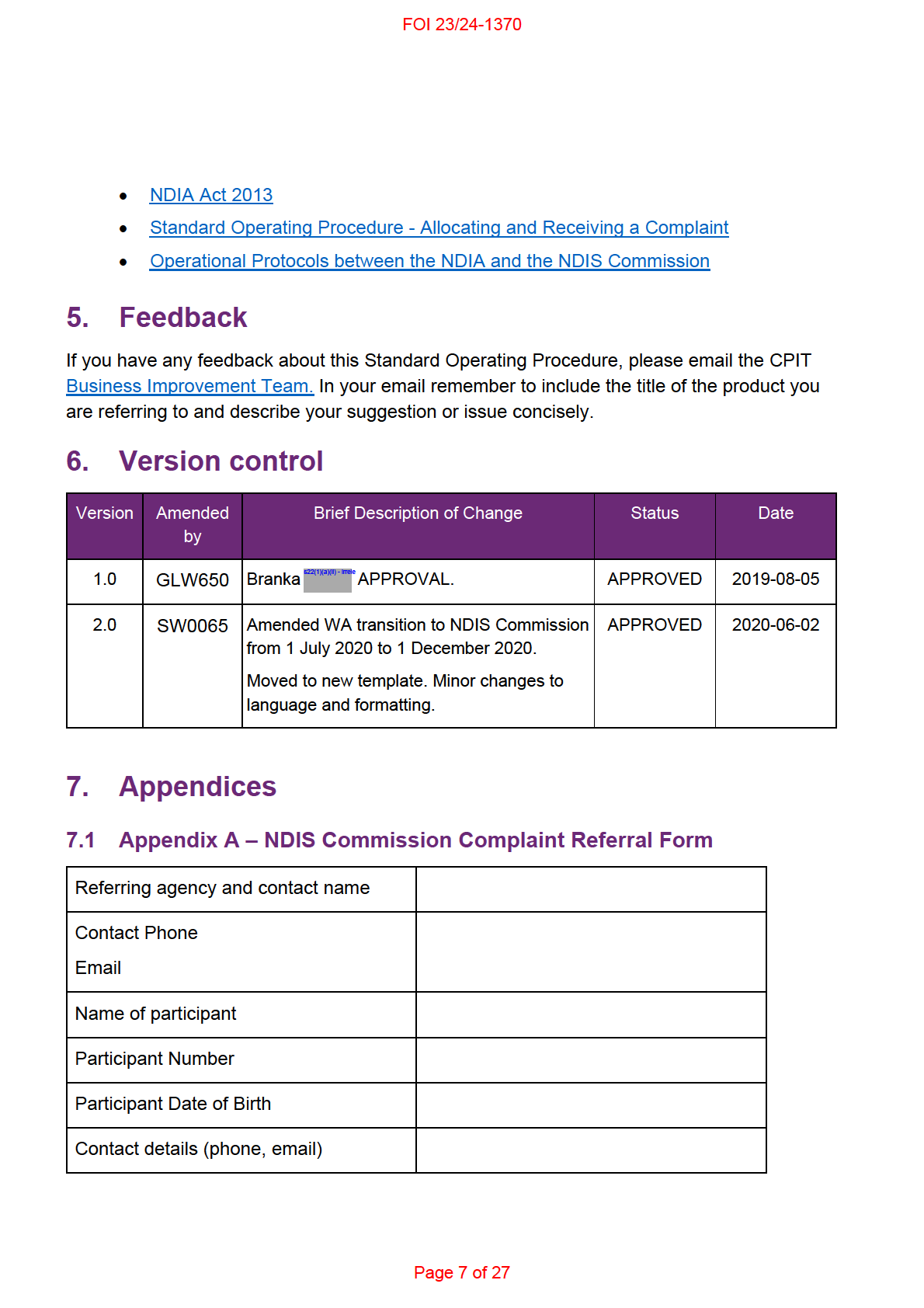
FOI 23/24-1370
Referring agency and contact name
Capacity to be involved in complaint
Consent by participant/complainant to
refer the complaint to the NDIS
Commission or NDIA
Complainant’s name (if not participant)
Relationship to Participant
Contact details (phone, email)
Which service provider is the complaint
about?
Location of Service Provider
Service Provider contact details
Incident Date
(if known)
Incident Time
(if known)
What is the complaint about?
What has the complainant done so far
to resolve the issue?
Has a complaint been made to another
agency, if so, which and when?
What was the outcome?
What would the complainant like to
happen to resolve the complaint?
Page 8 of 27
FOI 23/24-1370
Referring agency and contact name
Any other service providers involved
with the participant?
If so, please provide details
Are there any safety issues?
If so, please document
Page 9 of 27
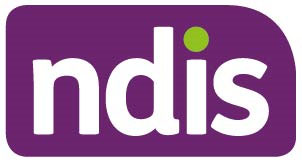

FOI 23/24-1370
DOCUMENT 3
OFFICIAL
Complaint Handling and
Reportable Incidents
Arrangements
Operational Protocol
As agreed between the National Disability Insurance Agency and the NDIS Quality and Safeguards
Commission
Date: 23 June 2023 (V2.1)
For internal staff use only – not for distribution
Page 10 of 27
FOI 23/24-1370
OFFICIAL
Contents
Complaint Handling and Reportable Incidents Arrangements ........................................................................ 1
Operational Protocol ....................................................................................................................................... 1
1. About the Operational Protocol ............................................................................................................... 5
2. Purpose ................................................................................................................................................... 5
3. Relevant Areas ........................................................................................................................................ 5
4. Roles and Responsibilities ...................................................................................................................... 6
5. Agreed Principles .................................................................................................................................... 7
General .................................................................................................................................................... 7
Legal ........................................................................................................................................................ 7
Complaint Assessment and Referral Process ......................................................................................... 7
Shared complaints process (NDIA and NDIS Commission) .................................................................... 8
Participant critical incident/ Reportable incident assessment and information sharing process .............. 9
6. Governance ........................................................................................................................................... 11
Regular Meeting Schedule .................................................................................................................... 11
Change Process .................................................................................................................................... 11
Escalation Process ................................................................................................................................ 11
Key Contacts ......................................................................................................................................... 12
7. Appendix - Related documents .......................................................................................................... 13
Other Operational Protocols .................................................................................................................. 13
Email transfer templates ........................................................................................................................ 13
Complaint Referral Form ....................................................................................................................... 14
8. Escalation Prioritisation Matrix .......................................................................................................... 18
OFFICIAL
2
June 2023
Page 11 of 27
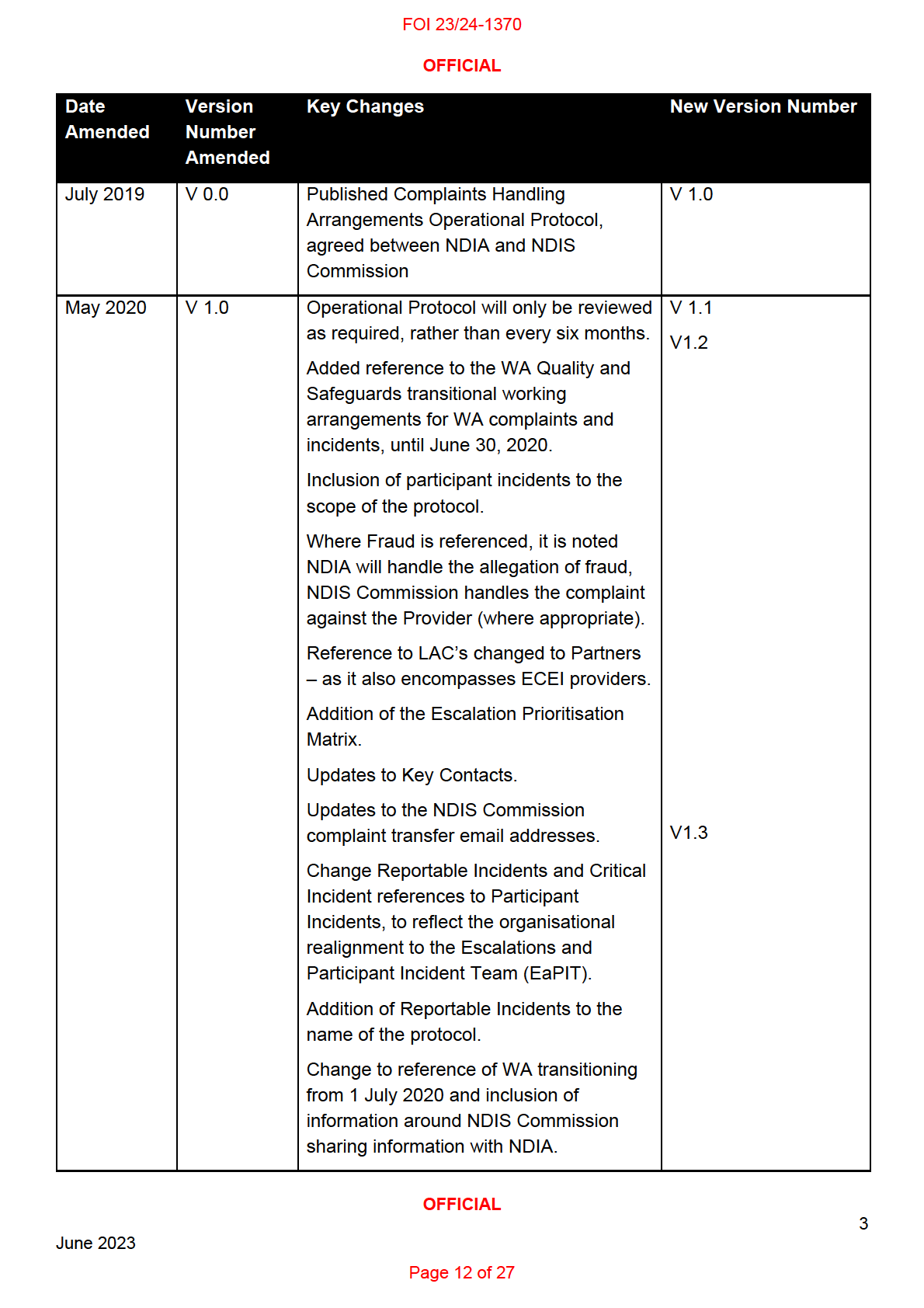
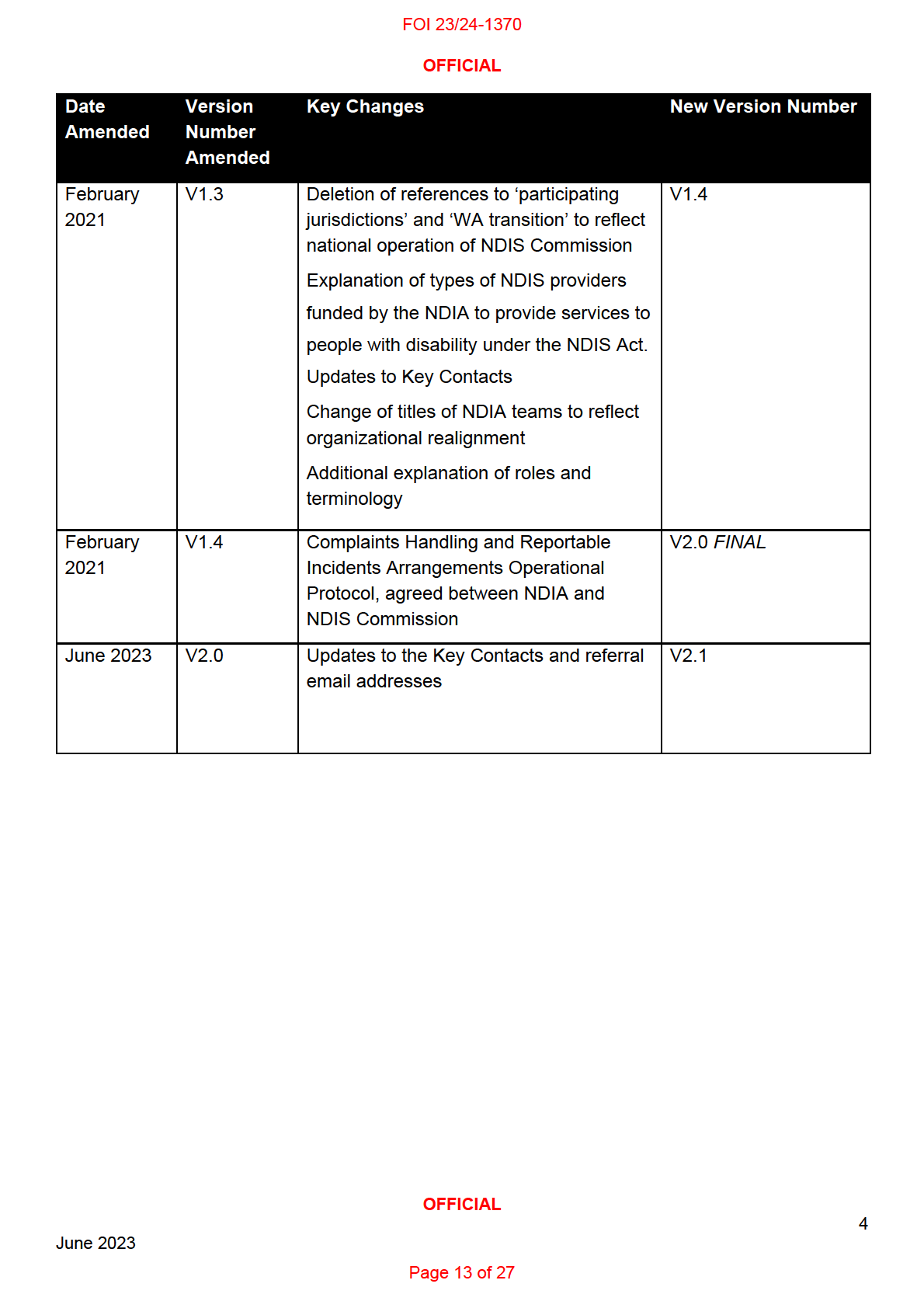
FOI 23/24-1370
OFFICIAL
1. About the Operational Protocol
The National Disability Insurance Agency (NDIA) and the NDIS Quality and Safeguards Commission (NDIS
Commission) agreed a Statement of Intent in June 2018 to work collaboratively in supporting each other to
perform individual and shared responsibilities under the
National Disability Insurance Scheme Act 2013 (NDIS Act).
The NDIA and NDIS Commission each have authority under sections 60, 66, 67A and 67E of the NDIS Act
to disclose protected NDIA or protected Commission information to each other:
For the purpose of the NDIS Act (this includes purposes that are relevant to achieve the objects,
principles and functions of each agency under the Act);
For relevant research about the NDIS or for policy development or for actuarial analysis of NDIS
matters (NDIA only) where the CEO of the NDIA or Commissioner of the NDIS Commission is
satisfied it is reasonably necessary to disclose that information for those purposes
With the express or implied consent of the person to whom the information relates. Where
practicable, express consent will be sought rather than relying on implied consent;
If either party reasonably believes that the disclosure of the information is necessary to prevent or
lessen a serious threat to an individual’s life, health or safety;
Where the CEO of the NDIA or Commissioner of the NDIS Commission is satisfied on reasonable
grounds that it is in the public interest to disclose the information;
For the purpose of the NDIA or NDIS Commission as set out in s66 (1)(b)(i) and s67E(1)(b)(i) of the
Act.
This Operational Protocol is to be read in conjunction with the Information Statement of Intent signed by the
NDIA and NDIS Commission in June 2018. This Operational Protocol is agreed between the NDIA and the
NDIS Commission.
The NDIA and NDIS Commission will jointly monitor the implementation of this Operational Protocol and
review its operation as required.
These arrangements will be in place from 18 February 2021 noting that the NDIS Commission operates in
all states and territories.
2. Purpose
This protocol sets out the agreed roles and responsibilities of the NDIA and NDIS Commission in regard to
the effective management and resolution of complaints received by either agency, and participant critical
incidents (PCIs) reported to the NDIA’s Participant Incident team and Reportable Incidents (RIs) notified to
the NDIS Commission.
3. Relevant Areas
The protocol covers complaints, feedback, PCIs, RIs and enquiries relating to participant wellbeing which
may need to be referred (in whole or part) through established referral processes. Workflow and
operational processes for referral, resolution and closure are included and will be updated, as required.
Should there be any other types of enquiries that arise in the everyday work of either the NDIA or the NDIS
Commission and there is no clear pathway described in this or any other protocol between the two
OFFICIAL
5
June 2023
Page 14 of 27
FOI 23/24-1370
OFFICIAL
agencies, the Key Contacts listed in this protocol can be used to work on how these matters can best be
resolved.
4. Roles and Responsibilities
Complaints
The NDIA and NDIS Commission have a responsibility in complaint resolution for determining the agency
best placed to respond to complaints. Both the NDIA and the NDIS Commission have complaint handling
functions and have appointed leads to operationalise this protocol.
The
NDIS Commission can accept and handle complaints about an issue arising out of, or in connection
with the provision of supports or services by an ‘NDIS provider’.
“NDIS providers” includes persons and bodies funded by the NDIA under the NDIS Act to provide services
to people with disability, such as Early Childhood (EC) and Local Area Coordination (LAC) services
provided by NDIA Partners in the Community; NDIS Community Connector Program providers, Specialist
Support Coordination Services, Exceptionally Complex Support Needs Program providers and Independent
Assessors. The NDIA monitors the performance of these bodies under their funding contracts. The sharing
of data on complaints received by the NDIS Commission about such bodies is dealt with under the Data
Access and Transfer Protocol. A complaint can be made about services or supports provided by any NDIS
provider, whether or not the provider is registered with the NDIS Commission.
Complaints about providers may relate to the conduct of workers employed or engaged by the provider
(including volunteers.)
The
NDIA will continue to:
Deliver the NDIS—providing individualised plans and support to people with disability, and coordinating
service bookings, payments and access to plans for providers.
Handle complaints about the NDIA and participant plans.
Handle allegations about alleged fraud and payment integrity as agreed against the NDIS (NDIS
Commission template - Referral to NDIA fraud and compliance). It is important to note that whilst the
NDIA will handle the allegation of fraud (as per the Regulatory Interface Protocol), the NDIS
Commission will continue to handle a complaint about the provider where appropriate, as per below the
‘Shared Complaints Process’ in Section 5 Agreed Principles.
Reportable incidents and participant critical incidents
The NDIS Commission has a specific responsibility under the NDIS Act to respond appropriately to
notifications by registered providers of ‘reportable incidents’. Only
registered providers are required to
report such incidents to the NDIS Commission. The NDIS Commission may disclose incident information to
the NDIA for the purposes of the Act in accord with this protocol.
Where the NDIA and its partners receive notice of a PCI the NDIA will follow this protocol in determining
when and how incident information is to be disclosed to the NDIS Commission. The NDIA may consider
that the incident should be reported to the NDIS Commission as a ‘notifiable incident’ as it fits the criteria of
a ‘reportable incident’ and involves a registered provider, or that information about the incident should
otherwise be shared with the NDIS Commission for consideration of possible action under the Act.
Matters relating to agency staff
The NDIS Commission will manage incidents and complaints in relation to its staff, processes and
decisions.
OFFICIAL
6
June 2023
Page 15 of 27
FOI 23/24-1370
OFFICIAL
The NDIA will manage incidents and complaints in relation to NDIA staff, NDIA processes and NDIS
decisions.
5. Agreed Principles
General
Where there is an extreme or high risk to a participant this will be managed via the escalation
prioritisation matrix at section 7.4 of this protocol, then escalated via the key contacts listed in
section 6 and information shared as appropriate.
Participants and people making complaints about the NDIS will be supported by the NDIA and the
NDIS Commission through a ‘no wrong door’ approach where it appears an issue raised in a
complaint is better addressed by the other agency.
Some complaints might include issues to be addressed or actions to be undertaken by both
agencies in a coordinated way through regular communication and updates.
General feedback and enquiries may be handled by another body with the consent of affected
parties and where the body has authority or jurisdiction to manage the response.
Legal
It is best practice to seek the express consent of the person making a complaint and/or affected
parties prior to sharing information about the complaint.
Information disclosure powers will only be used as required, and by officers with the appropriate
delegation or authority, noting the NDIS Commission and the NDIA have authority to disclose
information for the purposes summarised at item 1.
Complaint Assessment and Referral Process
General
The initial assessment of a complaint should determine if there is an immediate risk to a participant
or if the complaint includes allegations of a criminal nature which should be referred to police, or
matters which should be referred to child protection or other agencies best placed to respond to a
matter.
The response and any referrals will be prioritised according to the risk to a NDIS participant and
whether it is more appropriate that another agency deals with the complaint and responds to that
risk.
When either agency identifies the complaint needs to be referred, the complainant should be given
the option of having the complaint referred by that agency or being given the relevant contact
information and details so they can contact the other agency themselves.
The NDIS Commission and NDIA will maintain a list of contact officers as per section 6 of this
protocol. The NDIS Commission and NDIA will ensure that any referrals addressed to individual
contact officers will also be emailed to appropriate mailboxes to maintain visibility of those referrals.
OFFICIAL
7
June 2023
Page 16 of 27
FOI 23/24-1370
OFFICIAL
Referrals from NDIS Commission to the NDIA
Non-priority cases, where the risk is assessed as Low or Medium according to the escalation
prioritisation matrix in section 7.4, will be referred to the NDIA via the
s47E(d) - certain operations of agencies mailbox.
Priority cases, where the risk is assessed as Extreme or High according to the escalation
prioritisation matrix, will be referred within the time frames detailed in the escalation prioritisation
matrix in section 7.4 and can be referred by phone to the NDIA National Complaints Team, (with the
call details confirmed in follow-up email via appropriate mailbox).
Referrals from the NDIA to the NDIS Commission
The NDIA will refer non-priority cases to the NDIS Commission via
s47E(d) - certain operations of agencies
Priority issues can be referred by phone to the relevant key contact at the NDIS Commission and
followed up by email. If this contact is unsuccessful, the referring officer will call the NDIS
Commission’s 1800 035 544 and ask to speak to the relevant Assistant Director/Director,
Complaints.
Shared complaints process (NDIA and NDIS Commission)
Complaints in which both agencies have a role are referred to in this document as ‘shared
complaints’. The steps to be taken by each agency to manage shared complaints are summarised
in the Workflow diagram: Complaints Scenario 3 at the end of this document.
Initial consultation in relation to shared complaints will occur within 24 hours (or as soon as practical
to accommodate weekends/holidays).
Initial consultation will determine which agency will lead the coordination and response on behalf of
both agencies. Where possible, the issues raised in a complaint may be separated with each
agency leading and responding to their respective matters.
When separating matters, the referring agency should, where possible, provide a high level
overview of other matters raised, allowing the other agency to provide an assurance to
complainants about who is handling the respective matters.
OFFICIAL
8
June 2023
Page 17 of 27
FOI 23/24-1370
OFFICIAL
Participant critical incident/ Reportable incident assessment and information
sharing process
Participant critical incident is a term used by the NDIA to refer to incidents involving NDIS
participants that come to the attention of NDIA staff and NDIA partners that require investigation to
ensure the safety of a NDIS participant. These include:
unexplained death of a National Disability Insurance Scheme (NDIS) participant that occurs
in connection with the provision of NDIS supports or services
serious injury of an NDIS participant
abuse or neglect of an NDIS participant
unlawful sexual or physical contact with, or assault of, an NDIS participant
sexual misconduct committed against, or in the presence of, an NDIS participant, including
grooming of the NDIS participant for sexual activity
unauthorised use of a restrictive practice in relation to an NDIS participant
a NDIS participant threatening or attempting self-harm.
PCIs often include incidents involving a NDIS provider, both un-registered and registered.
When NDIA Service Delivery teams, including Partners, receive a notification of a PCI that meets
the threshold of a reportable incident, they will refer the incident in the first instance to
s47E(d) - certain operations of agencies This will occur regardless of the registration status of the
provider.
‘Reportable incidents’ (RIs) are defined types of incidents that occur in connection with the provision
of supports or services by a registered provider.
Only registered providers are required to notify the NDIS Commission of such ‘reportable incidents’.
Reportable incidents under the NDIS Act are overseen by the NDIS Commission and managed by
providers. In some cases the NDIS Commission may conduct its own investigation or consider the
need for other action.
The NDIA and the NDIS Commission may liaise on and discuss PCIs that involve an unregistered
provider, to explore best options for dealing with and responding to such information within their
roles and responsibilities.
Where the Participant Incident team considers the incident meets the scope of the NDIS Quality and
Safeguards Commission’s definition of a reportable incident, it will forward the incident as a
notifiable incident to the NDIS Commission according to the jurisdiction where the incident is alleged
to have occurred:
s47E(d) - certain operations of agencies
s47E(d) - certain operations of agencies
s47E(d) - certain operations of agencies
s47E(d) - certain operations of agencies
s47E(d) - certain operations of agencies
s47E(d) - certain operations of agencies
s47E(d) - certain operations of agencies
s47E(d) - certain operations of agencies
OFFICIAL
9
June 2023
Page 18 of 27
FOI 23/24-1370
OFFICIAL
The referral will allow the NDIS Commission to seek a notification from the Registered NDIS
Provider where appropriate.
When the NDIS Commission receives a notifiable incident from the NDIA that does not meet the
definition of reportable incident, the NDIS Commission will inform the NDIA via email to
s47E(d) - certain operations of agencies
Participant critical incidents not involving reportable incidents of registered providers
Where the Participant Incident team considers the PCI may be relevant to the NDIS Commission’s
functions, a member of the team will liaise with the relevant NDIS Commission contact as listed in
section 6 to discuss the possible referral to or sharing of information about the incident with the
NDIS Commission including the form it should take and the email address to which it is to be sent.
Where the agencies agree the matter is to be referred as a complaint to the NDIS
Commission, the referring staff member will be the complainant for the purposes of the NDIS
(Complaints Management and Resolution) Rules 2018.
The NDIS Commission will disclose incident information to the NDIA under this protocol
where:
The incident information highlights concerns for an NDIS participant’s wellbeing or is
relevant to the NDIA’s administration and review of participant plans, access and funding
decisions.
The incident involves the death of a participant and the information raises questions relevant
to the NDIA’s administration or review of the participant plans, access and funding decisions,
or the conduct of any NDIS provider contracted by the NDIA to provide services to people
with disability, referred to in Section 3 of this protocol.
This information will be provided by email to s47E(d) - certain operations of agencies
Disclosure of information necessary to prevent or lessen a serious threat
Disclosures made by the NDIS Commission of information reasonably believed to be necessary to
prevent or lessen a serious threat to an individual’s life, health or safety will be emailed to
s47E(d) - certain operations of agencies using the subject line “Concern regarding safety of a person with
a disability.”
Such disclosures will occur AFTER all appropriate action is taken within the control of the NDIS
Commission to address any immediate safety concerns for any person, such as calling emergency
services.
The NDIA will ensure the information is shared with the relevant National Delivery or Partner
Performance staff to give consideration to any actions that should be taken to ensure participant
safety. This may include, but is not limited to, direct contact with the participant, follow up with a
service provider that is currently in regular contact with the participant, or contact with the support
co-ordinator, guardian or nominee of the participant to ensure their wellbeing. Any contacts will be
generic in nature if the consent of the participant is not noted in the NDIS Commission referral.
OFFICIAL
10
June 2023
Page 19 of 27
FOI 23/24-1370
OFFICIAL
The NDIA will acknowledge the receipt of information and advise the NDIS Commission that the
information has been referred to the appropriate area for action/information, or otherwise clarify if
the person is not known to the NDIA within 5 working days.
Disclosures made by the NDIA of information reasonably believed to be necessary to prevent or
lessen a serious threat to an individual’s life, health or safety will be made by phone to the relevant
key contact at the NDIS Commission and followed up by email. If unsuccessful, call the 1800 035
544 and ask to speak to the relevant Assistant Director/Director, Complaints.
Such disclosures will occur after all appropriate action is taken within the control of the NDIA to
address any immediate safety concerns for any person, such as calling emergency services
6. Governance
Regular Meeting Schedule
The NDIA and NDIS Commission will meet at agreed intervals to review these Operational
Protocols. The SES and EL2s for each agency will meet at regular intervals to discuss operations
relating to the application of this protocol and will try to resolve any operational issues arising under
this protocol.
Change Process
Minor changes to the Operational Protocols are encouraged and shall be decided upon by joint
agreement between all parties. The document should be updated to reflect the changes and provide
an ongoing record of agreed protocols.
Escalation Process
Issues arising from the operationalisation of these protocols will be raised at the EL2 level. If the
issue cannot be resolved, it will be escalated to SES level at both the NDIA and the NDIS
Commission.
OFFICIAL
11
June 2023
Page 20 of 27
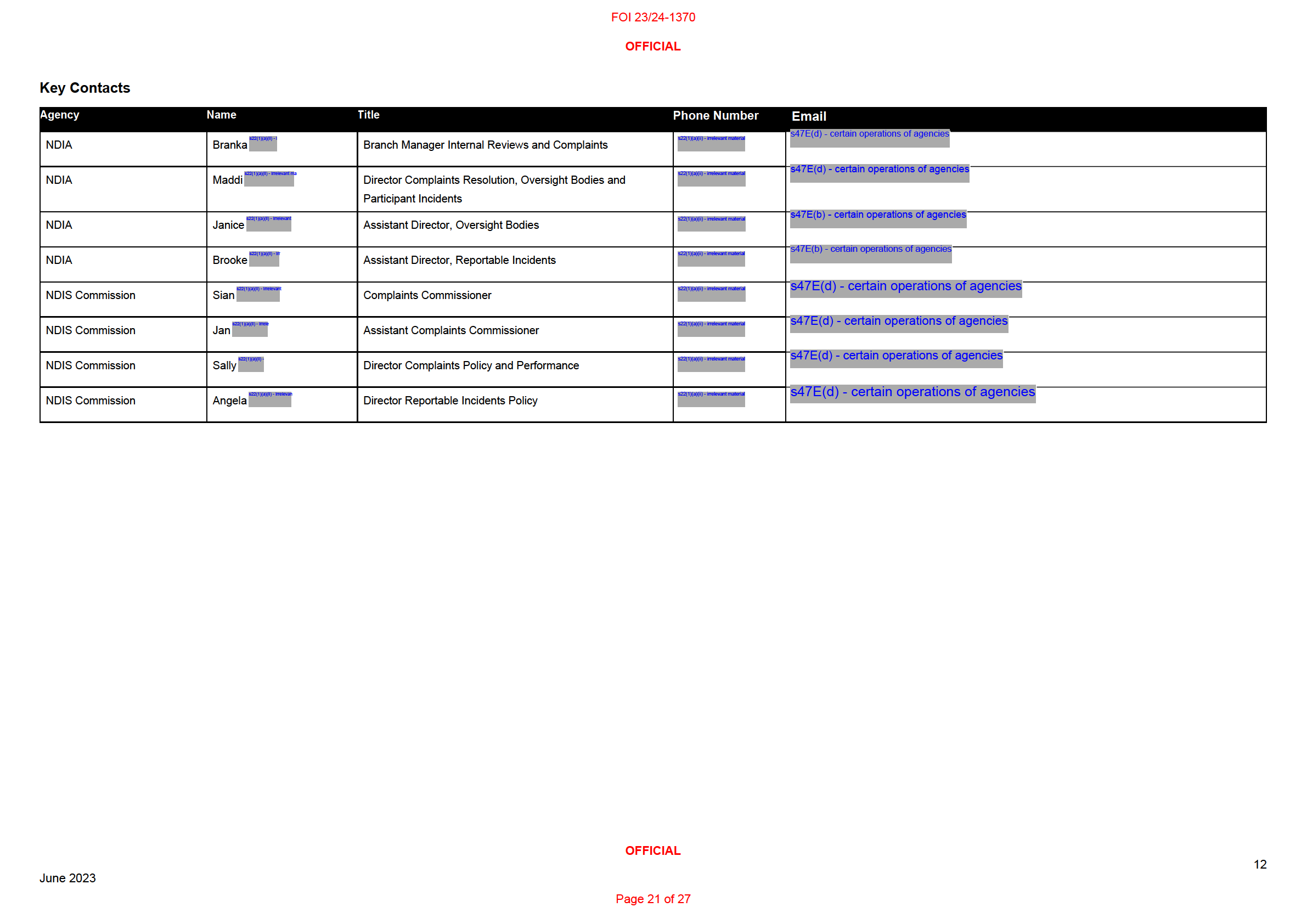
FOI 23/24-1370
OFFICIAL
7. Appendix - Related documents
Other Operational Protocols
NDIS Participants at risk
Data Access and Transfer
Market Stewardship Oversight
Regulatory interface – registration, compliance and fraud
Complex
Support
Email transfer templates
This email template is to be used to transfer information in both directions between the NDIA and
the NDIS Commission.
Email subject: NDIA/ NDIS Commission complaint transfer – [Complainant name]
Dear
NDIA/NDIS Commission
We have received a complaint from
[Complainant’s name] [Participant number or Address or Date of Birth].
[Insert complaint –dot point/initial approach screen/paragraph format]
I am writing to bring this matter to your attention as it seems that it may be appropriately addressed through
your usual complaint handling processes.
[C’s name] has agreed to the transfer of this complaint and has
been informed that you will contact them by
[close of business in 5 working days].
(for referral to the NDIS Commission) the issues raised relate to an NDIS provider, the quality of service
provision or the conduct of a worker.
Note: multiple correspondence attachments should not be included.
[C’s name] contact details are:
Phone:
[insert]
Email:
[insert]
Address:
[insert]
Please contact me if you have any questions about this transfer.
Email subject: NDIA/ NDIS Commission shared complaint– [Complainant name]
Dear
NDIA/NDIS Commission
We have received a complaint from
[Complainant’s name] [Participant number or Address or Date of Birth].
[Insert complaint –dot point/initial approach screen/paragraph format]
I am writing to bring this matter to your attention as it seems it may be appropriately addressed by the NDIA
and the Commission. I would like to work with you to respond to the matters raised.
[C’s name] has agreed
to the NDIA and NDIS Commission liaising to respond to this complaint and understand they will be
contacted by
[close of business in 5 working days].
[C’s name] contact details are:
OFFICIAL
13
June 2023
Page 22 of 27
FOI 23/24-1370
OFFICIAL
Phone:
[insert]
Email:
[insert]
Address:
[insert]
Please contact me if you have any questions about this transfer.
Complaint Referral Form
This form is for both complaints transfers and shared complaints
Referring agency and contact name
Insert text
Contact Phone
Insert text
Email
Insert text
Name of participant
Insert text
Participant Number
Insert text
Participant Date of Birth
Insert text
Contact details (phone, email)
Insert text
Capacity to be involved in complaint
Insert text
Consent by participant/complainant to refer the
Insert text
complaint to the NDIS Commission or NDIA
Complainant’s name (if not participant)
Insert text
Relationship to Participant
Insert text
Contact details (phone, email)
Insert text
Which service provider is the complaint about?
Insert text
Location of Service Provider
Insert text
Service Provider contact details
Insert text
Incident Date (if known)
Insert text
Incident Time (if known)
Insert text
What is the complaint about?
Insert text
What has the complainant done so far to resolve
Insert text
the issue?
Has a complaint been made to another agency,
Insert text
if so, which and when?
OFFICIAL
14
June 2023
Page 23 of 27
FOI 23/24-1370
OFFICIAL
Complainant’s name (if not participant)
Insert text
What was the outcome?
Insert text
What would the complainant like to happen to
Insert text
resolve the complaint?
What action is the referring Agency requesting
Insert text
in relation to the complaint?
Any other service providers involved with the
Insert text
participant?
If so, please provide details
Are there any safety issues?
Insert text
If so, please document
Any sensitivities? (e.g. don’t contact
Insert text
participant’s father)
For the NDIA, please email the completed form to:
s47E(d) - certain operations of agencies
For the NDIS Commission, please email s47E(d) - certain operations of agencies
Workflows for complaint handling
When transferring a complaint the following workflows should be followed
Scenario 1 NDIA receives complaint
Scenario 2 NDIS Commission receives complaint
Scenario 3 Shared complaint
OFFICIAL
15
June 2023
Page 24 of 27
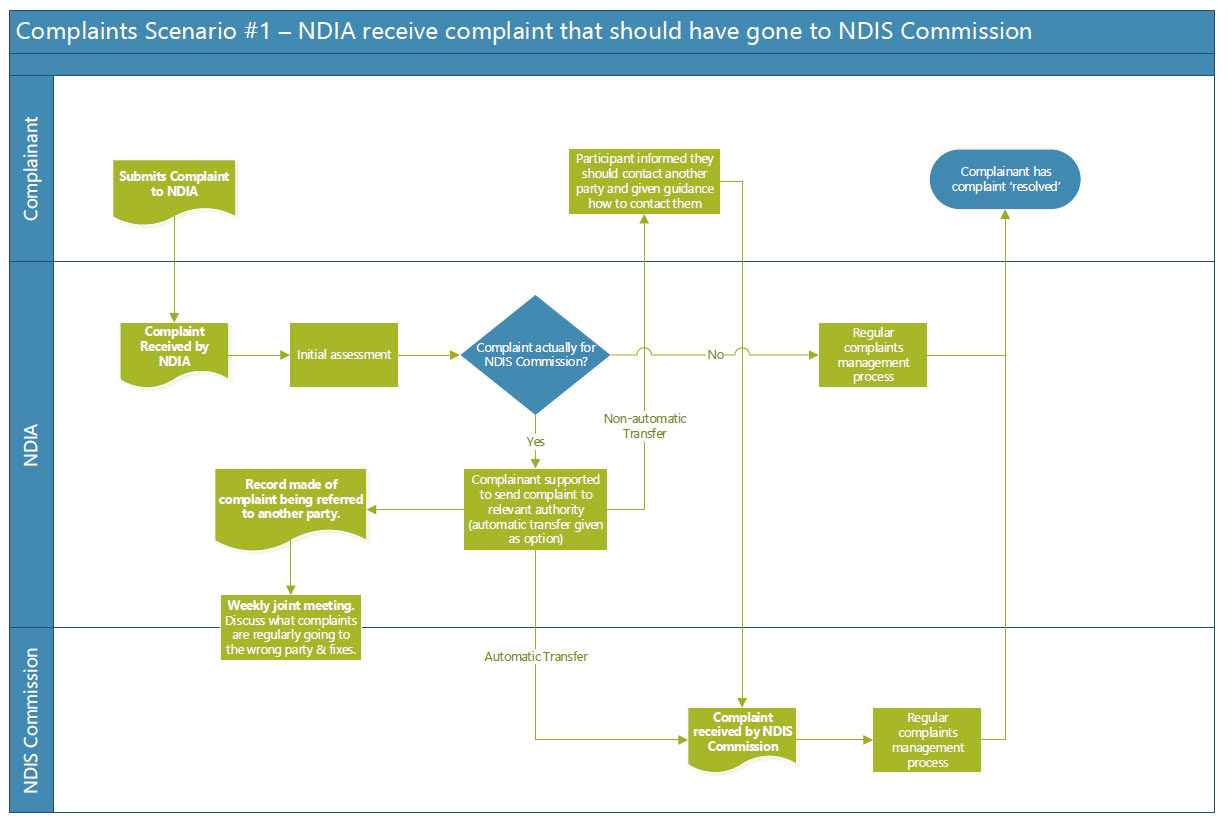
FOI 23/24-1370
OFFICIAL
16
June 2023
Page 25 of 27
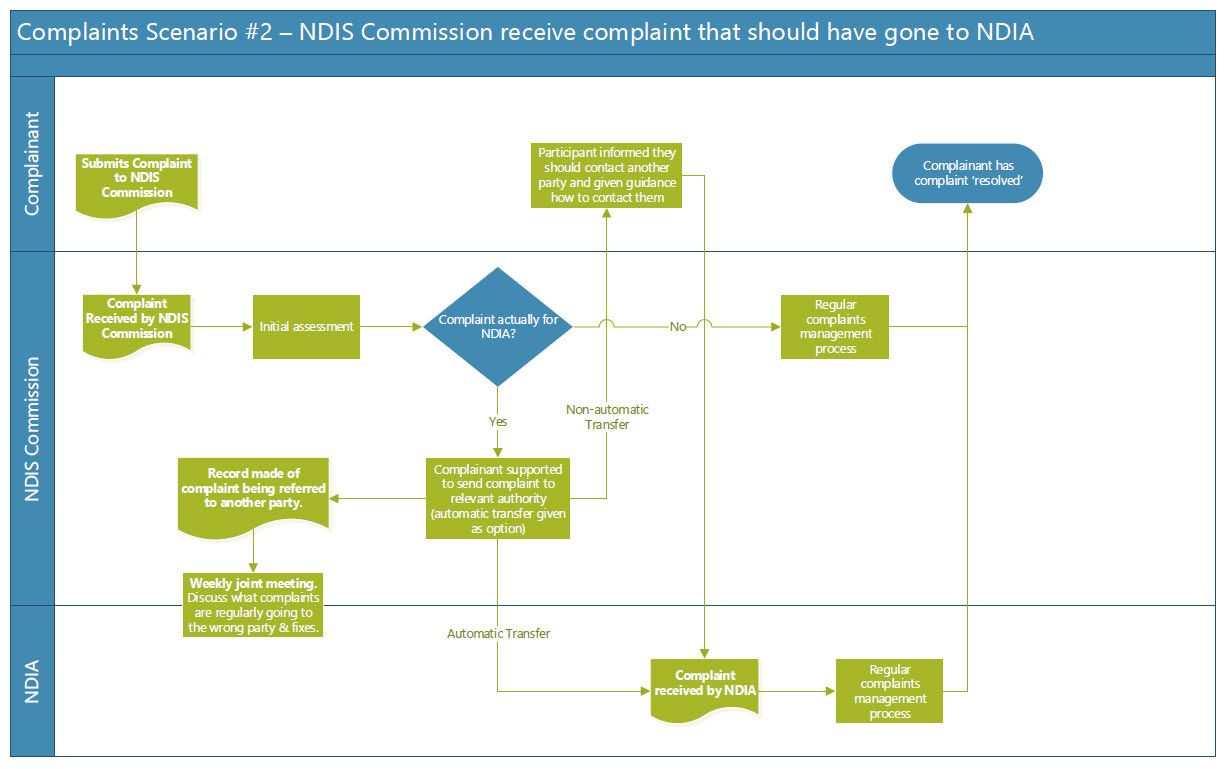
FOI 23/24-1370
OFFICIAL
OFFICIAL
17
June 2023
Page 26 of 27
s47E(d) - certain operations of agencies










